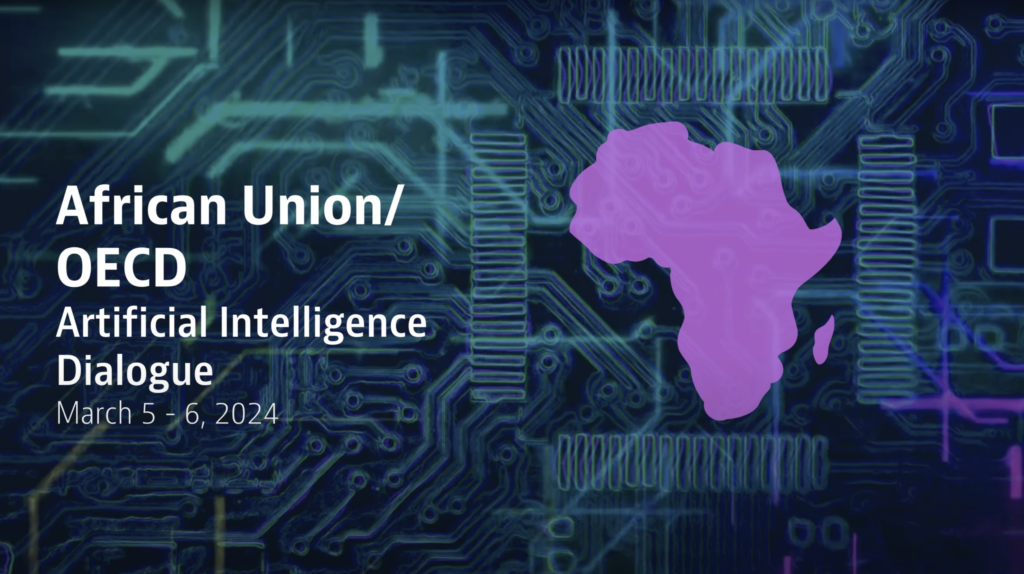Building the foundations for collaboration: The OECD-African Union AI Dialogue

The OECD-African Union (AU) Artificial Intelligence (AI) Dialogue, held in Paris from 5 to 7 March 2024, set a new benchmark in collaboration between two central entities in international AI governance. Supported by the United Kingdom, the closed-door event highlighted the need for truly global cooperation to foster trustworthy AI. The dialogue facilitated discussions on AI governance and addressed joint challenges, serving as a platform for sharing ideas, strategies, and expectations from across continents.
Event highlights
The event kicked off with welcome remarks from Jerry Sheehan, Director for Science, Technology and Innovation at the OECD; Nicole Gregory, Deputy Director of the UK Foreign, Commonwealth & Development Office (FCDO) International Technology Department; and Souhila Amazouz, Senior Digital Policy Officer from the African Union Commission. Their insights set the tone for a dialogue centred on mutual learning, collaboration, and a shared ambition to harness AI for the global good.

How to craft effective AI governance approaches
Participants took a comprehensive approach to examining and learning from AI governance approaches at different levels, from international and regional to national scopes, with a particular focus on bolstering these efforts through concrete AI regulation.
The dialogue provided a cross-cutting, international perspective on what is needed to design and implement AI governance strategies and approaches that balance innovation with ensuring that AI is designed and deployed in a trustworthy manner consistent with the OECD AI Principles. A session by Karine Perset, Head of the OECD.AI Policy Observatory, highlighted the OECD’s foundational role in setting global norms, emphasising how the OECD AI Principles serve as a beacon for the responsible stewardship of trustworthy AI. The session complemented this International Perspective: From Global Initiatives to Global Governance, where representatives from the UK, UN, UNESCO, The World Bank, Council of Europe, EU Agency for Fundamental Rights (FRA), and Inter-American Development Bank (IDB) shared insights on other international efforts to harmonise AI governance and opportunities for AU member states to reinforce their involvement in global governance efforts.
To enrich the discussion and provide lessons learned from trailblazing regional approaches, Melody Musoni from the European Centre for Development Policy Management set the stage with an expert talk on envisioning Africa’s AI governance landscape in 2024, offering a forward-looking perspective on the unique challenges and opportunities within the African context, suggesting pathways for integrating African priorities into the global AI governance discourse. This was followed by an overview of the AU’s ongoing development of an ambitious Artificial Intelligence Continental Strategy for Africa (AACS) by Amr Safwat from the Egyptian Ministry of Communications and Chair of the AU AI Working Group. Melhem Daoud from the European Commission (EC) presented the EU’s Coordinated Plan on Artificial Intelligence, sharing insights from the world’s most advanced regional approach to AI governance and illustrating the importance of contextualised governance frameworks.
The session on Implementing the OECD AI Principles and Designing National AI Strategies brought these themes home. Dr Hossam Osman (Egypt) and Engelbert Beyer (Germany) shared insights into their own national AI strategies, including developmental pathways, evaluation criteria, and key achievements so far. Lucas dos Anjos and Armando Guio presented ongoing work by the Brazilian National Data Protection Authority to establish a regulatory sandbox for AI, and Joseph Phillips from the UK showcased efforts to align their national AI strategy and the UK AI Regulation White Paper with the OECD AI Principles.
One of the core pillars of AACS is regulation and turning broad strategy into practice. To support this strategy, the Approaches for Regulating AI session delved into the nuances of AI regulation, showcasing the need for adaptable policies that evolve with AI advancements. This was underscored by the diverse regulatory approaches and policy instruments presented by Joseph Phillips from the UK Department for Science, Innovation and Technology (DSIT), Elinor Wahal from the EC, and Anna Pietikäinen from the OECD’s Public Governance Directorate.

How to build AI capacity for tomorrow today
The dialogue underscored the critical role of education, infrastructure, and supportive policies in building AI capacity. The Building Skills and Capacities for AI session, led by Conrad Tucker, Director of Carnegie Mellon University Africa, emphasised the importance of STEM education and the pressing need for programmes that bridge the gap between technical skills and ethical considerations in AI development.
Alongside regulation, building and nurturing cross-sector AI ecosystems is another one of the core pillars of the AACS. A session dedicated to this topic explored the multifaceted components of a thriving AI ecosystem and highlighted the synergies between academia, industry, civil society, and government. Facilitated by Nicole Primmer from Business at OECD (BIAC), the discussion included insights on how collaborative platforms can foster innovation and address societal challenges through AI, featuring expert contributions from the Egypt University of Informatics, the Partnership on AI, the EC, and Credo.ai.
Other sessions focused on foundational AI inputs critical to moving from AI strategies and principles to hands-on practice. The Data and AI for Development panel shed light on the transformative potential of AI in accelerating development goals, with contributions from PARIS21, UN Global Pulse, and the OECD. The discussion focused on leveraging data and AI to create impactful solutions in various sectors, emphasising the importance of quality data and inclusive policies that ensure benefits reach all strata of society.
On the hardware side, Keith Strier,Vice President of Worldwide AI Initiatives at NVIDIA, delivered a presentation on how essential it is to have a national AI compute strategy. The talk featured findings and publications from the OECD Expert Group on Compute and Climate and illuminated the logistical backbone required to support AI’s growth, advocating for strategic investments in AI compute resources as a national priority.

Unlocking AI’s potential benefits
This dialogue also made sure to celebrate AI’s transformative impacts, with a special focus on health, women’s empowerment, and public sector digital transformation. The AI for Health session provided a compelling look at how AI technologies are reshaping healthcare delivery, diagnostics, and patient care, with insights from Keith Hanna, CEO of IPRD Solutions, along with clinician, policymaker, and civil society perspectives. The session concluded that the primary barriers to adopting responsible AI in health are the lack of harmonisation between AI and data governance, hindering effective and equitable scaling of innovation, and the absence of engagement from the public and healthcare providers in the development of AI solutions.
The conversation around Building a Data-Driven and AI-Enabled Public Sector highlighted AI’s capacity to transform government operations. Insights from Barbara Ubaldi, Head of the OECD’s Digital Government and Data Unit, on the OECD’s digital government frameworks illustrated practical examples of AI enhancing public service delivery, transparency, and citizen engagement, pointing to a future where AI is a foundational element in public sector innovation.
As explored further in a dedicated OECD.AI blog, the panel Catalysing AI for Women’s Empowerment in Africa tackled AI’s pivotal role in promoting gender equality.

Bridging governance and applied research: site visit to CEA Paris-Saclay
After two days of rich dialogue and insightful sessions, the event featured a unique opportunity for participants to connect policy with practice through a group visit to CEA Paris-Saclay. Recognised as one of Europe’s largest scientific research centres, CEA Paris-Saclay is a beacon of innovation and collaboration dedicated to addressing pressing societal challenges, especially those emerging from new technologies. This visit not only provided an exclusive glimpse into cutting-edge research and development activities but also sparked conversations about the practical applications of AI in solving real-world problems. The experience underscored the critical role of research institutions like CEA Paris-Saclay in shaping the future of technology and society, offering a tangible connection to the themes and aspirations discussed throughout the dialogue.


Interactive experiences at CEA Paris-Saclay
Lasting impressions and forward momentum
One of the goals of the event was to identify opportunities for heightened involvement in global AI governance by the AU and its member states. In his opening remarks for the second day, Carlos Conde from the OECD Global Relations Secretariat emphasised the importance of the Africa-OECD Partnership and Memorandum of Understanding, which serve as a foundation for bilateral engagement, bringing the two international organisations closer together.
The OECD-AU AI Dialogue underscored the necessity of continuous dialogue and action. From the discussions on the strategic use of AI in public sectors to gender equality and building AI ecosystems, the dialogue provided an extensive overview of the quickly evolving AI landscape, fostering a nuanced understanding of how AI governance, capacity building, and deployment can be harmonised across diverse global contexts.
The detailed discussions and expert insights provided a multifaceted understanding of the challenges and opportunities that lie ahead in the AI domain. They emphasised the importance of international cooperation, mutual learning, and inclusive strategies to ensure that AI development leads to beneficial outcomes for all of humanity.

The path ahead
As the dialogue concluded, it was clear that this event was not an endpoint but a milestone in the ongoing journey towards responsible AI governance. The discussions, insights, and partnerships offer a solid foundation for future collaboration between the OECD, the AU, and other global stakeholders. The event presents a timely opportunity for sharing information and best practices to inform the development of the African Union’s Artificial Intelligence Continental Strategy for Africa and other AI initiatives across the continent. In addition to facilitating the exchange of knowledge and expertise, this event also played a crucial role in fostering closer policy dialogue, promoting consistency, and enhancing interoperability in global AI governance.
Participants emphasised their hope that this dialogue will have a lasting impact, guiding AI governance towards a future where technology serves humanity universally and equitably. Reflecting on this event, one cannot help but be optimistic about the potential for international cooperation in AI governance. The OECD-AU AI Dialogue has laid down a marker for what can be achieved when diverse voices come together, united by a common goal of harnessing AI for the good of all.




































